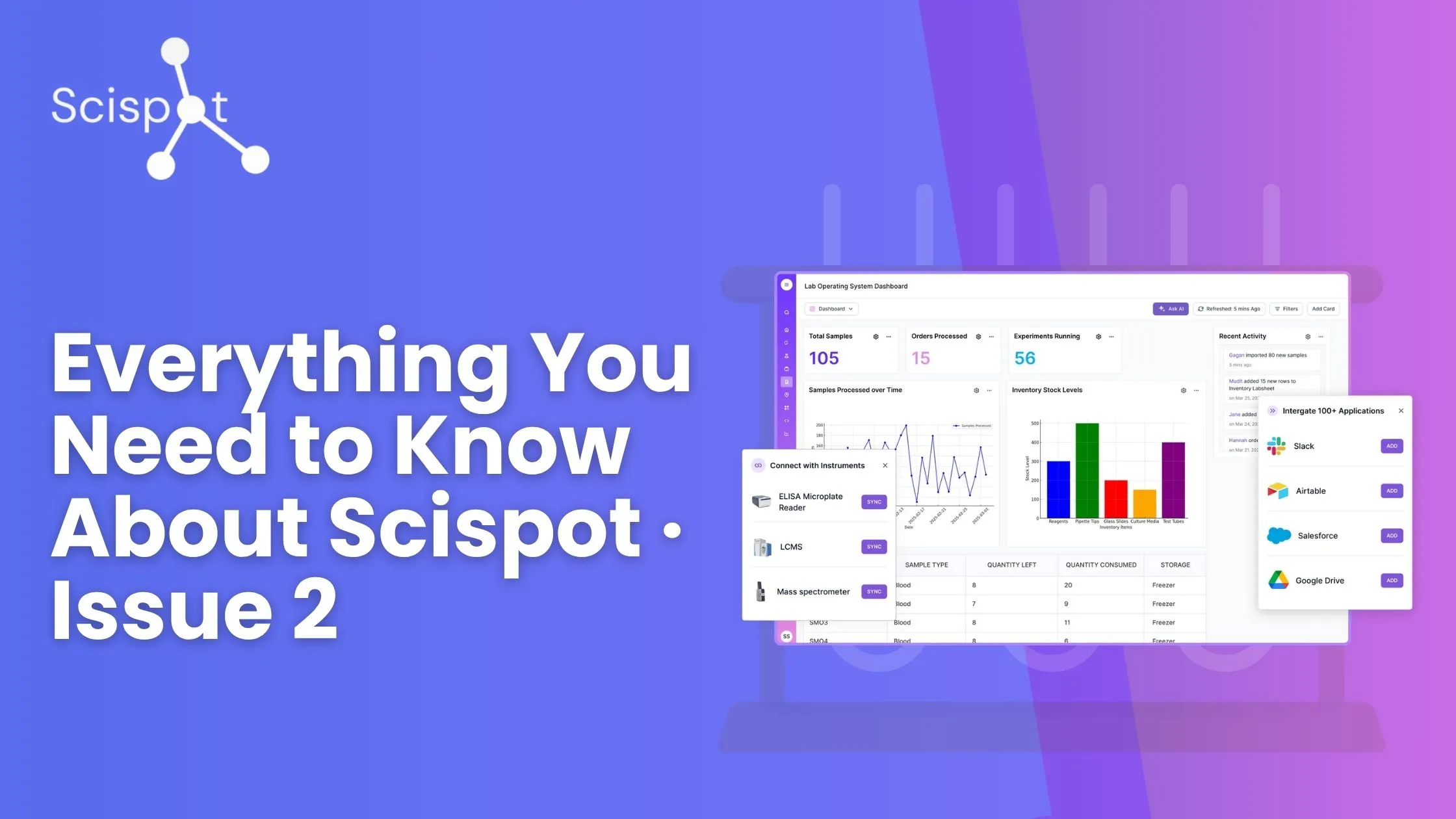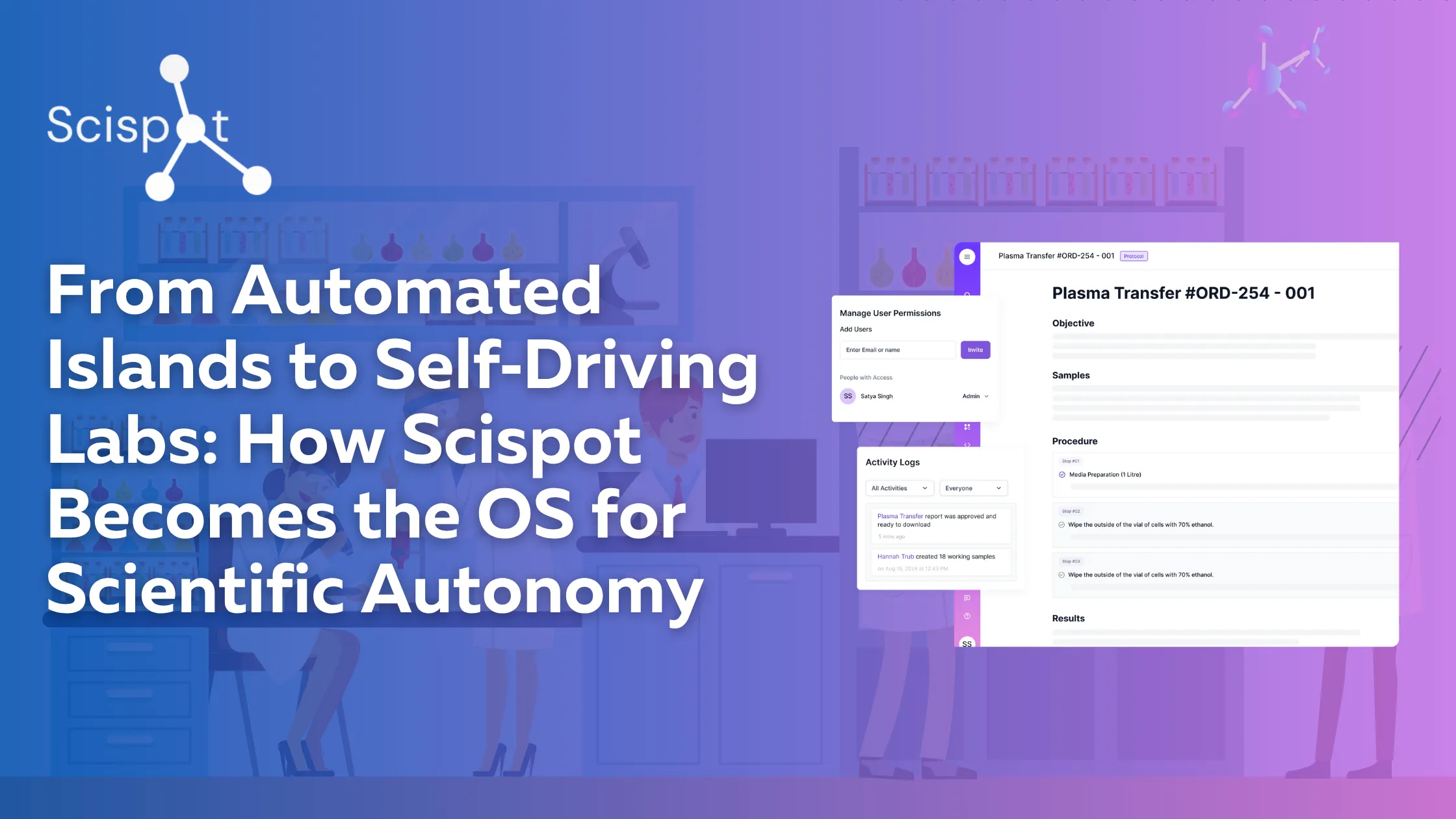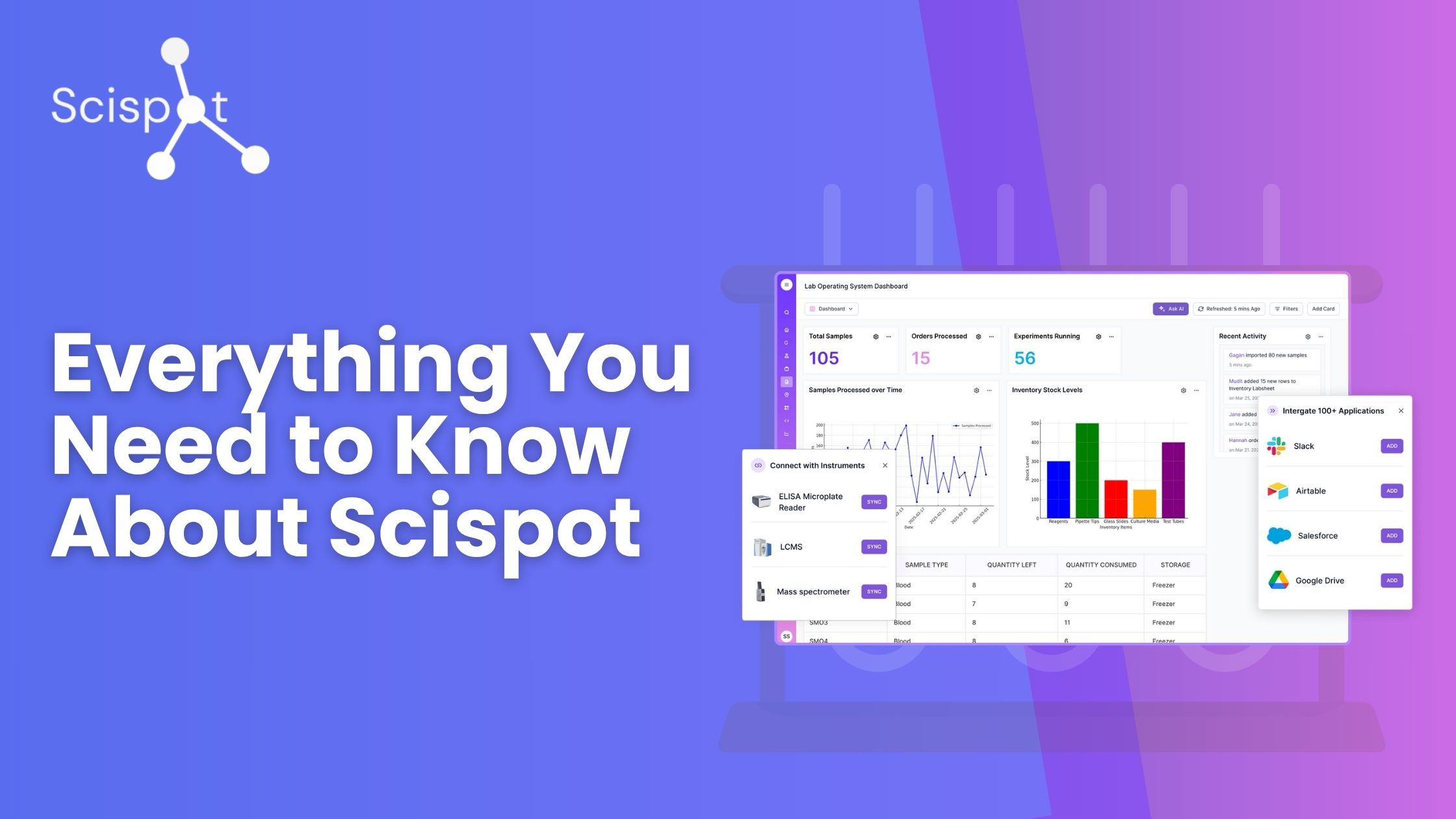Scientific data management is evolving rapidly as labs face unprecedented volumes of complex research information. While Zontal has established a presence in the life sciences informatics space, many research organizations are now exploring additional options to address their growing needs for flexibility, integration, and scalability.
The search for the right data management platform is increasingly important as labs navigate diverse data types, instrument connectivity, and collaboration requirements. A solution that perfectly fits one organization's workflow might present challenges for another, making it essential to understand the full landscape of available options.
In this comprehensive guide, we'll explore the top 8 Zontal alternatives in 2025, comparing their features, strengths, and unique value propositions. Whether you're looking to optimize workflows, improve data accessibility, or enhance collaboration capabilities, this comparison will help you identify which platform best aligns with your specific research objectives and budget considerations.
The Leading Scientific Data Management Platforms: A Detailed Comparison
1. Scispot
.png)
Scispot has positioned itself as a comprehensive alternative to Zontal in the scientific data management ecosystem. Their integrated lab operating system tackles the complex data management challenges facing modern research teams with a cloud-native architecture that scales effectively across organizations of various sizes.
What makes Scispot stand out among Zontal alternatives is its holistic approach to data management. Instead of requiring separate tools for different functions, Scispot delivers integrated SDMS, LIMS, ELN, inventory tracking, and analytics capabilities in one unified platform. This integration helps research teams eliminate the data silos that often slow discovery.
The platform's GLUE integration engine represents a significant technological advantage. By enabling straightforward connections with over 7,000 applications and 200+ laboratory instruments, Scispot allows teams to create automated data workflows without extensive IT resources. This connectivity eliminates manual data entry and the errors that typically accompany it.
Time-to-value is a crucial metric for labs implementing new systems. While many platforms require extended implementation periods, Scispot typically gets labs operational within 6-12 weeks through its no-code configuration capabilities. This approach empowers laboratory staff to adapt workflows without programming expertise or continuous vendor support.
A research director at a biotechnology company noted: "Scispot's interface was refreshingly straightforward to navigate. Our team configured workflows specific to our needs within days rather than months, and the learning curve was minimal compared to other systems we've used."
Scispot's AI assistant, Scibot, transforms how scientists interact with their research data. By enabling natural language requests for experiment creation, result analysis, and report generation, Scibot eliminates navigation through complex menus and accelerates common laboratory tasks.
For labs handling diverse research data types, Scispot provides adaptable frameworks that accommodate everything from next-generation sequencing data to high-throughput screening results with consistent performance. This versatility eliminates the need for separate specialized systems for different research areas.
2. LabVantage
As one of the most established Zontal competitors in the scientific informatics market, LabVantage brings decades of experience to its comprehensive LIMS platform. Founded in 1981, the system offers robust regulatory compliance capabilities that make it particularly suitable for highly regulated industries including pharmaceuticals and food safety testing.
The platform encompasses extensive functionality for sample tracking, electronic documentation, and quality management processes. LabVantage's primary strengths lie in its mature feature set developed over years of industry experience, with particular emphasis on supporting complex regulatory environments.
The platform's enterprise-oriented design does present certain tradeoffs. Implementation projects typically span 9-12 months and require significant professional services support, which increases the overall investment compared to newer cloud-based alternatives. Users sometimes mention that the learning process can be steeper than with more recently developed platforms.
A quality assurance manager in pharmaceuticals shared: "LabVantage provides excellent compliance capabilities for our regulated workflows, but onboarding new team members takes longer than we'd prefer due to the interface complexity. We're exploring systems that maintain compliance while improving usability."
Organizations evaluating LabVantage should consider the IT resources required for successful implementation and ongoing system maintenance, which may present challenges for teams without dedicated technical support staff.
3. Lockbox LIMS
Lockbox LIMS has emerged as a cloud-based Zontal alternative with particular strength in specimen tracking and inventory control. The platform serves diverse scientific sectors including life science research, industrial quality control, and biotech operations with support for key regulatory frameworks including CLIA, HIPAA, 21 CFR Part 11, and ISO 17025.
Their multi-tiered sample management system enables detailed storage hierarchy definition from facility-level organization down to individual container positions. This granular location tracking works particularly well for facilities managing complex sample archives and biobanking operations.
Where Lockbox presents opportunities for enhancement is in its analytical capabilities and system connectivity. Users occasionally report limitations when integrating with laboratory instruments and third-party applications, which may require workarounds that impact operational efficiency. The platform's reporting and visualization tools may not provide the depth available in more analytics-focused solutions.
"Lockbox effectively manages our sample tracking requirements, but we encountered some integration hurdles with our analytical equipment," explained a laboratory operations manager. "This required us to maintain parallel systems for data analysis, which introduced additional complexity to our workflows."
For laboratories primarily concerned with specimen management and basic inventory tracking with minimal integration requirements, Lockbox offers a viable solution, though teams requiring sophisticated data analytics may need to explore complementary tools.
4. Dotmatics
Dotmatics has developed a comprehensive scientific informatics suite through strategic acquisitions, establishing itself as a notable Zontal competitor in the life sciences market. Their portfolio encompasses tools for chemistry research, biological studies, and scientific data analytics under unified vendor management.
Their acquisition of LabArchives expanded their electronic notebook capabilities, particularly benefiting academic research environments. Dotmatics delivers strong chemistry-oriented functionality with molecular structure searching and visualization features that appeal to medicinal chemistry organizations.
The evolutionary path of Dotmatics through acquisitions creates certain integration considerations. Users occasionally mention that the various platform components may operate more like connected standalone products than a fully unified system. Data transfers between modules sometimes require manual intervention, which can affect workflow continuity.
A research informatics leader observed: "Dotmatics provides numerous valuable components, but we continue to experience some workflow disconnects between their different modules. Stronger integration would significantly enhance our overall experience."
Their premium Zontal pricing positions them in the higher investment tier, especially when deploying multiple system components. This cost structure may present considerations for smaller research organizations operating with limited technology budgets.

5. CDD Vault
CDD Vault specializes in chemistry data and bioassay management, offering a focused Zontal alternative for specific scientific domains. The platform excels in compound registration and structure-based information retrieval with effective visualization tools for analyzing structure-activity relationships.
The system provides solid visualization capabilities for chemistry workflows and facilitates collaborative research through secure data sharing mechanisms. Their concentration on small molecule drug discovery has developed a dedicated user base within this research specialty.
CDD Vault's specialized focus creates certain limitations for laboratories spanning multiple scientific disciplines. Research teams focused on biological applications may find the platform's capabilities more oriented toward chemistry workflows, potentially requiring additional systems for comprehensive research support. This multi-platform approach can introduce data integration challenges.
"CDD Vault serves our chemistry requirements effectively, but our biology operations required implementing a separate platform," noted a research program director. "Managing information across multiple disconnected systems creates coordination overhead we'd prefer to avoid."
The domain-specific focus makes CDD Vault appropriate for chemistry-centered research programs but less ideal for multidisciplinary teams seeking unified data management. By comparison, platforms offering equal support for diverse scientific disciplines provide more cohesive research environments.
6. Sapio Sciences
Sapio Sciences offers an AI-enhanced LIMS and ELN solution that competes as a Zontal competitor with particular strength in automation-intensive laboratories. Their robust data analytics and machine learning capabilities appeal to organizations prioritizing advanced data science applications.
Their platform encompasses inventory control, electronic documentation, and compliance monitoring with AI capabilities that facilitate insight extraction from complex experimental datasets. Laboratories conducting high-throughput screening particularly value Sapio's automated data analysis capabilities.
The advanced nature of Sapio Sciences introduces a steeper learning curve. Implementation typically requires substantial expertise and generally takes longer than more straightforward platforms. The sophisticated functionality brings complexity that can be challenging for research teams without dedicated informatics support.
A researcher from a genomics facility explained: "Sapio's advanced capabilities initially impressed us, but we underestimated the expertise required for implementation and system maintenance. We're currently evaluating alternatives that provide similar functionality with reduced complexity."
The Zontal price comparison places Sapio Sciences and Zontal in comparable investment categories, though Sapio implementations often involve higher total costs due to extended consulting requirements.
7. eLabNext
eLabNext delivers an integrated ELN, LIMS, and workflow management platform functioning as a cloud-based Zontal alternative. Their system supports experiment documentation, specimen management, and equipment monitoring with emphasis on research collaboration.
Their modular architecture allows laboratories to begin with core functionality and expand capabilities as requirements evolve. This scalable approach makes eLabNext attractive for growing organizations with evolving informatics needs.
The platform presents potential limitations in scenarios requiring extensive customization or sophisticated analytics. Users occasionally report challenges with search functionality and organizing complex experimental data. Certain specialized integrations may require significant configuration effort compared to platforms with purpose-built integration frameworks.
"eLabNext addresses our basic documentation requirements, but we encountered certain constraints when implementing more sophisticated workflows," explained a laboratory manager. "The customization options sometimes required adapting our processes to the software rather than configuring the system to match our established procedures."
While Zontal reviews sometimes highlight implementation complexity, eLabNext receives similar feedback regarding scalability as organizations grow. Research teams with evolving requirements occasionally find they outpace eLabNext's capabilities and explore more adaptable solutions.
8. SciNote
SciNote positions itself as an accessible scientific data management solution with open-source foundations. Their compliance and collaboration features serve academic and government laboratories with straightforward documentation requirements.
The platform handles basic inventory tracking and protocol documentation with an intuitive interface that minimizes training requirements. Their pricing structure makes SciNote accessible for smaller laboratories operating with limited technology budgets.
Where SciNote offers room for enhancement is in advanced automation capabilities and sophisticated analytics functionality. Users occasionally mention limitations in data analysis tools and integration options compared to more comprehensive platforms.
A researcher from an academic laboratory noted: "SciNote effectively supports our basic documentation needs, but as our research became increasingly data-intensive, we encountered certain functional constraints. We're currently evaluating alternatives that can accommodate our expanding analytics requirements."
Organizations seeking straightforward electronic documentation may find SciNote sufficient, while those requiring comprehensive data management with advanced analytics will likely benefit from more robust platforms like Scispot.

System Integration: The Critical Foundation for Modern Research Informatics
The ability to seamlessly connect instruments, software applications, and collaborative partners has become fundamental to efficient laboratory operations. Traditional platforms often face integration challenges that may require custom development for each connection, potentially creating isolated data repositories that hinder collaborative research.
Contemporary laboratories operate complex technology ecosystems that must function cohesively to accelerate discovery. When evaluating Zontal alternatives, integration capabilities represent a primary consideration due to their substantial impact on research productivity and data integrity.
Scispot's GLUE integration technology exemplifies the contemporary approach to scientific data connectivity. This framework establishes automated information flows between instruments, analysis tools, and reporting systems without requiring complex programming or vendor intervention. As one researcher using Scispot explained: "The improvement in our workflow efficiency was remarkable. Data now transfers automatically from our instruments to our analysis environment, eliminating manual processes and the errors they typically introduce."
This integration-centered architecture transforms previously disconnected systems into cohesive data environments where information moves seamlessly between components. For laboratories seeking enhanced connectivity, platforms with robust integration frameworks provide effective solutions for eliminating data silos and creating connected research ecosystems.
The ROI Equation: Balancing Investment Against Productivity Gains
Scientific data management represents a significant investment that must deliver measurable returns through improved research efficiency, enhanced data quality, and accelerated discovery timelines. When evaluating Zontal pricing against alternatives, organizations should consider total cost of ownership including implementation services, training, ongoing support, and potential scaling fees.
Traditional platforms often require substantial upfront investment plus significant consulting services for implementation and customization. Many Zontal reviews highlight unexpected cost escalations when adding users or expanding functionality, creating budgetary uncertainty for growing organizations.
By contrast, modern cloud-based platforms typically offer more transparent pricing models with predictable scaling costs. Scispot's approach includes transparent pricing that grows proportionally with organization size, avoiding the surprise cost increases that frustrate many research operations directors.
Implementation timeline directly impacts return on investment, with faster deployment accelerating productivity gains. While traditional systems often require 6-12 months before delivering value, solutions like Scispot typically become operational within 6-12 weeks, providing much faster returns on technology investments.
The most significant ROI factor often comes from improved research efficiency. Scientists using intuitive, well-integrated platforms spend less time on data management and more time on discovery. Automated workflows eliminate repetitive tasks, reducing labor costs and accelerating research timelines. These productivity gains frequently outweigh licensing costs, creating substantial positive returns from scientific informatics investments.

AI and Machine Learning: Reshaping Research Data Management
Artificial intelligence has evolved rapidly from experimental technology to essential research capability. In 2025, AI-enhanced scientific data platforms help research teams automate routine tasks, extract insights from complex datasets, and accelerate discovery timelines.
Many established platforms have approached AI integration incrementally, potentially limiting its transformative potential for laboratory operations. This approach may insufficiently address the growing demand for intelligent automation in research processes.
Scispot has integrated AI as a foundational capability through Scibot, an AI research assistant that converts system interactions from menu navigation to natural conversation. This allows scientists to engage with experiments and data through intuitive dialogue, execute workflows more efficiently, and make informed decisions based on AI-enhanced insights.
Researchers can simply instruct Scibot to create experiments, analyze results, or generate reports, eliminating time-consuming manual processes. A laboratory director using Scispot noted: "AI capabilities have fundamentally changed our interaction with research data. We're accessing insights previously unavailable to us, which has transformed our approach to scientific discovery."
For organizations evaluating Zontal alternatives, AI capabilities represent an increasingly important factor that distinguishes leading platforms from legacy systems as research becomes more data-intensive and analytically complex.
Selecting Your Optimal Platform: Essential Evaluation Criteria
When assessing alternatives to Zontal, research organizations should prioritize these key factors that significantly impact implementation success and long-term value:
Deployment Timeline: Traditional scientific data platforms typically require 6-12 months for full implementation. Modern alternatives like Scispot offer substantially faster deployment, generally 6-12 weeks, enabling organizations to realize value much sooner.
Customization Capabilities: The ability to adapt workflows without vendor assistance has become essential for research teams operating in dynamic environments. No-code configuration tools enable laboratories to evolve their systems alongside changing research requirements without additional development expenses.
System Connectivity: Contemporary laboratories require seamless connections between instruments, software applications, and external collaborators. Platforms with integrated connectivity frameworks eliminate data isolation and create unified research environments.
User Interface Design: Adoption rates directly influence ROI for scientific data management systems. Intuitive interfaces reduce training requirements and user resistance, increasing the likelihood of successful implementation.
Technical Support: Implementation assistance and ongoing support quality significantly affect long-term satisfaction. Platforms offering dedicated account management and domain-specific expertise provide greater value than those with generic technical support.
AI Integration: As artificial intelligence becomes increasingly central to research operations, platforms designed to leverage AI capabilities offer significant advantages in automation, insight generation, and decision support.
Performance Scaling: Research informatics requirements evolve over time. Platforms with cloud-native architectures can expand smoothly without performance degradation, avoiding the costly migrations often required with traditional systems.
By carefully evaluating these factors, research organizations can identify the Zontal alternative that best aligns with their specific requirements and future growth trajectory.
Moving Forward: Selecting the Right Scientific Data Platform
The scientific data management landscape continues evolving rapidly as research becomes increasingly data-intensive. Organizations require flexible, user-friendly systems that adapt to changing requirements without creating technical or budgetary constraints.
Each platform in this comparison offers distinct advantages and specializations, making the optimal choice dependent on your specific research focus, budget parameters, and organizational workflows.
For laboratories seeking a contemporary, adaptable solution that accommodates diverse research needs, Scispot stands out among Zontal alternatives with its comprehensive functionality and flexible architecture. Its combination of efficient implementation, intuitive interface, and robust integration capabilities addresses common challenges in scientific data management.
With its streamlined interface, powerful GLUE integration engine, and AI-powered Scibot assistant, Scispot helps research teams accelerate discovery without the limitations of data fragmentation or technical barriers. As one Scispot customer explained: "Consolidating our data in a single platform has transformed our research efficiency. Scispot effectively supports both our chemistry and biology operations, a capability we hadn't found in alternative solutions."
Scispot represents a complete laboratory operating system designed to support research excellence today while providing the flexibility to adapt to future requirements.
Curious if Scispot is right for your lab? Book a free consultation call to compare it with your current setup.












